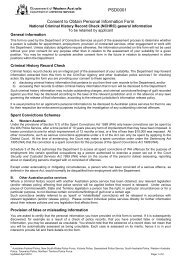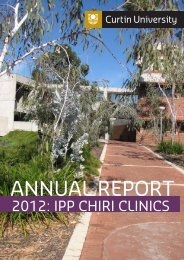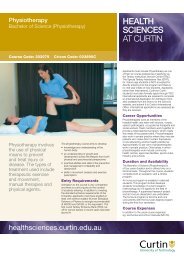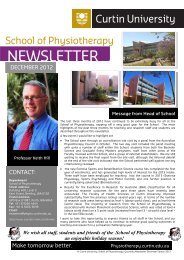ReSeaRch centRe foR aPPlied PSychology (RecaP) - Health ...
ReSeaRch centRe foR aPPlied PSychology (RecaP) - Health ...
ReSeaRch centRe foR aPPlied PSychology (RecaP) - Health ...
You also want an ePaper? Increase the reach of your titles
YUMPU automatically turns print PDFs into web optimized ePapers that Google loves.
School of Psychology and Speech Pathology ReCAP ANNUAL REPORT 2011<br />
21<br />
Research Interests<br />
Supervision of Psychotherapy; Therapist Development;<br />
Individual Psychotherapy; Psychodynamic Psychotherapy;<br />
Treatment of Adolescent Intrafamilial Sex Offenders;<br />
Gender and Identity.<br />
Publications<br />
Halse, A., Grant, J., Thornton, J., Indermaur, D., Stevens,<br />
G. & Chamarette, C. (2011). Intrafamilial adolescent sex<br />
offenders’ response to psychological treatment. Psychiatry,<br />
Psychology and Law, iFirst article, 1-15.<br />
Presentations<br />
Grant, J., Schofield, M, & Crawford, S. (2011). Do experienced<br />
supervisors utilize a theory of supervision? Symposium<br />
paper presented at the Society for Psychotherapy Research<br />
(SPR 2011) Conference, Bern, 29 June – 2 July.<br />
Schofield, M.J. & Grant, J.A. (2011). Supervision research<br />
methodology. Keynote paper presented at the ESCR seminar<br />
Series on Clinical Supervision, Supervision Practitioner<br />
Research Network. Leicester, 18-19 February 2011.<br />
Grant, J.A. & Schofield, M.J. (2011). The process of<br />
supervision research. Keynote paper presented at the<br />
ESCR seminar Series on Clinical Supervision, Supervision<br />
Practitioner Research Network. Leicester, 18-19 February 2011.<br />
Grant, J.A., Schofield, M.J., & Crawford, S. (2011). Managing<br />
difficulties in the supervisory relationship. Keynote address<br />
at the Supervision Research Conference. London, 22<br />
February 2011.<br />
Grant, J., Schofield, M, & Crawford, S. (2011). Supervision<br />
outcomes: Supervisor and supervisee outcomes. Paper<br />
presented at the 46th Annual Australian Psychological<br />
Society (APS) Conference, Canberra, 4-8 October.<br />
MARTIN HAGGER<br />
Professor<br />
PhD<br />
Brief Summary<br />
Professor Hagger is a research professor with diverse<br />
research interests in the areas of health and social<br />
psychology.<br />
Overview<br />
He obtained his undergraduate degree and Ph.D. from<br />
Loughborough University under the supervision of Prof.<br />
Stuart Biddle. His first academic post was in School of<br />
Psychology, University of Sheffield as a postdoctoral<br />
Research Fellow (Feb 1999 to Feb 2002). He then served<br />
as a lecturer in the Department of Psychology, University<br />
of Essex (Feb 2002 to Feb 2006) and Reader in Social and<br />
<strong>Health</strong> Psychology in the School of Psychology, University<br />
of Nottingham (Feb 2006 to Apr 2011). He served as Adjunct<br />
Professor at Curtin University (Oct 2010 to Apr 2011) and<br />
became a full Professor in Psychology at Curtin from April<br />
2011. He is a Chartered and Registered <strong>Health</strong> Psychologist<br />
with the British Psychological Society (BPS) and UK <strong>Health</strong><br />
Professions Council (HPC). He is a former Chair of the BPS<br />
Division of <strong>Health</strong> Psychology and a founder member and<br />
inaugural Honorary Treasurer of the BPS Division of Sport<br />
and Exercise Psychology.<br />
Memberships, Awards and Training<br />
Member, British Psychological Society, Division of <strong>Health</strong><br />
Psychology; Member, British Psychological Society, Division<br />
of Sport and Exercise Psychology; Accredited member,<br />
British Association of Sport and Exercise Sciences;<br />
Member, British Psychological Society Social Psychology<br />
Section; Member, European Association of Experimental<br />
Social Psychology; Member, European <strong>Health</strong> Psychology<br />
Society; Member, Self-Determination Theory Faculty;<br />
Member, Society for Personality and Social Psychology;<br />
Member, Social Psychology Network; Member, Society<br />
for the Study of Motivation; Member, UK Society of<br />
Behavioural Medicine.<br />
Research Interests<br />
His main research focus is the social processes involved in<br />
people’s ‘self-regulation’ of health behaviour. His research<br />
applies social cognitive and motivational theories as the<br />
Theory of Planned Behaviour and Self-Determination<br />
Theory to understand and to intervene and change diverse<br />
health behaviours such as exercise, dieting, binge drinking,<br />
and attendance to cancer screening. He is also involved<br />
in numerous social and health psychology projects such<br />
as (1) the effects of physical self-perceptions and on<br />
exercise behaviour, (2) the influences of self-control and<br />
ego-depletion on persistence on behaviours requiring selfcontrol,<br />
(3) a motivational and implemental intervention to<br />
reduce binge drinking in young employees, (4) cross-cultural<br />
approaches to multidimensional and hierarchical models of<br />
self-esteem, social physique anxiety, and models of social<br />
cognition in health contexts, and (5) illness perceptions and<br />
health-related behaviour. His principal research collaborator<br />
Dr. Nikos Chatzisarantis at the National Institute of<br />
Education at Nanyang Technical University, Singapore. He<br />
also has research collaborators in Estonia, Finland, Greece,<br />
Hong Kong, Hungary, Russia, Singapore, Spain, Sweden,<br />
Turkey and, of course, the UK.<br />
Publications<br />
Chan, D. K. C., Spray, C., & Hagger, M. S. (2011). Treatment<br />
motivation for rehabilitation after a sport injury: Application<br />
of the trans-contextual model. Psychology of Sport and<br />
Exercise, 12, 83-92. doi: 10.1016/j.psychsport.2010.08.005.<br />
Dahm, T., Neshat-Doost, H. T., Golden, A.-M., Horn, E.,<br />
Hagger, M. S., & Dalgleish, T. (2011). Age shall not weary us:<br />
Deleterious effects of self-regulation depletion are specific to<br />
younger adults. PLoS ONE, 6, e26351. doi: 10.1371/journal.<br />
pone.0026351.





![Mental health commission report July 2010 - June 2011 [.pdf]](https://img.yumpu.com/50755705/1/184x260/mental-health-commission-report-july-2010-june-2011-pdf.jpg?quality=85)











![2007 Annual Report [.pdf] - Health Sciences - Curtin University](https://img.yumpu.com/44476724/1/184x260/2007-annual-report-pdf-health-sciences-curtin-university.jpg?quality=85)